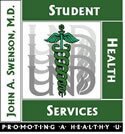|
Mononucleosis
Mononucleosis or "Mono" is an illness caused by several agents including the Epstein-Barr virus. Mono is spread through saliva, which means the disease is almost always spread through intimate contact. People who have had mono can still have the virus long after the illness is over, usually for about 30-45 days.
Early symptoms of Mono include:
- Run-down feeling
- Loss of appetite
- Slight headaches
After three to five days, symptoms usually become more apparent:
- Sore throat
- Fatigue
- Swollen glands
- Fever (temperature of 101 to 105 degrees Fahrenheit lasting around a week)
- Muscle aches
- Skin rash
A blood test can be done to determine if you have mono. If you test negative for mono but your symptoms continue to suggest that you have the infection, your health professional may repeat the tests.
Antibiotics are not useful in treating mono. Treatment includes adequate rest and a pain reliever such as Tylenol for fever, sore throat, and other aches and pains. Complications may occur including strep, inflammation of the liver, jaundice, and rupture of the spleen. The length of the illness varies greatly from person to person. About one-third of college students never need to stay in bed because their cases are so mild. If bed rest is required, you should be up and around within two weeks. Health care providers may restrict such things as drinking alcohol, and participating in strenuous activities or contact sports.
Treatment and care:
- Acetominophen for fever (no aspirin).
- Rest, increased fluids.
- Throat lozenges, salt water gargle, ice cream for sore throat.
- No vigorous exercise.
- Antibiotics if strep throat or another bacterial infection is present.
- Good nutrition, no alcohol.
- Recovery takes from one week to three months.
- If you are positively diagnosed with mononucleosis, let your academic counselor know so that you can plan your course load realistically during recovery.
Make an appointment at Student Health Services if you have:
- A temperature of 101 degrees Fahrenheit or more.
- A sore throat which is not getting better even with penicillin.
- Lack of appetite for two to three days.
- Continued fatigue in spite of adequate sleep.
- Symptoms related to mono lasting two to four days.
- A need for follow-up care after diagnosis.
Resource Links:
v Medlineplus Health Information. Infectious Mononucleosis. (www.nlm.nih.gov/medlineplus/infectiousmononucleosis.html)
|
|


